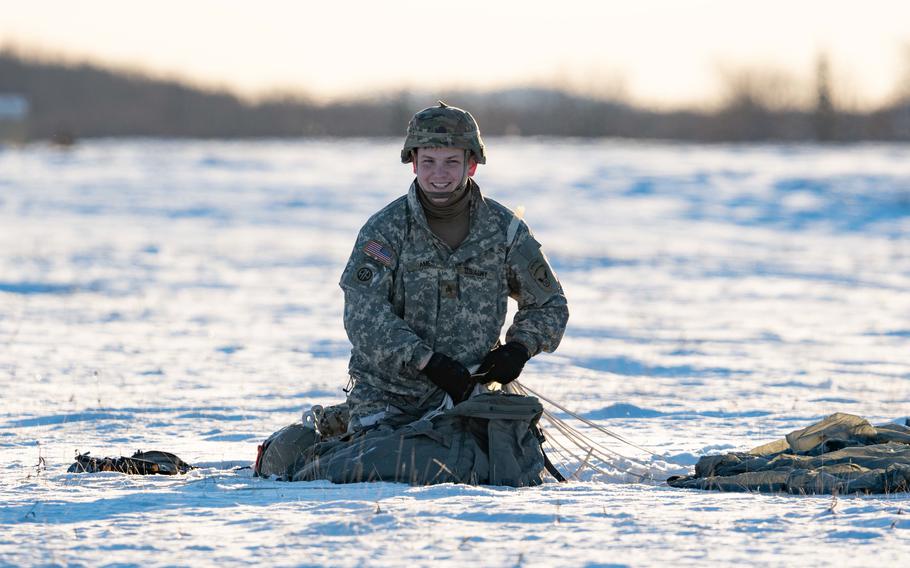
Army Sgt. Jake Ames, a paratrooper assigned to the 725th Brigade Support Battalion, 11th Airborne Division, packs up his gear after a jump at Malemute Drop Zone, Alaska, Nov. 4, 2022. Paratroopers from the 11th Airborne are among those flying to Finland and other northern European nations for Arctic Forge, an inaugural multinational exercise. ( Julia Lebens/U.S. Air Force)
STUTTGART, Germany — The U.S. Army in Europe on Thursday launched one of its largest drills in recent years in the Arctic, where thousands of troops are fanning out across Finland and Norway to test their cold-weather fighting skills.
Arctic Forge 23, an inaugural exercise led by U.S. Army Europe and Africa, comes as allies put greater emphasis on deploying combat-ready forces to NATO’s northern flank.
The Arctic drill, which runs until March 17, includes Finland’s Defense Exercise North and the exercise Joint Viking in Norway.
“Arctic Angel” soldiers from the Alaska-based 11th Airborne Division will take part in an “over-the-pole” flight to Finland. And soldiers from the 10th Mountain Division and Virginia Army National Guard will join the effort.
The focus will be on commanding and controlling a multinational force at the battalion level, USAREUR-AF said in a statement Wednesday.
“The goal of Defense Exercise North is to demonstrate readiness by deploying a combat-credible force to enhance power in NATO’s northern flank in support of our partner Finland, an aspiring NATO member,” the statement said.
Meanwhile, 730 Marines and 200 U.S. soldiers will take part in Joint Viking alongside more than 10,000 combined military personnel from Denmark, Germany, the Netherlands, Norway and the United Kingdom.
Joint Viking also involves winter warfare and maneuver training as well as live-fire drills carried out by the Army’s 41st Field Artillery Brigade.
The training in the High North is unfolding as Russia takes steps to fortify its position in the region, even as its forces are bogged down in Ukraine.
In an annual intelligence report released Monday, Norway noted that defense of Russian bases in the Arctic has become more critical for the Kremlin, given Moscow’s difficulties in Ukraine and overall tensions with the West.
Nuclear weapons could play a larger role in Russia’s strategy for defending its positions in the Artic, given its conventional losses in Ukraine, the Norwegian Intelligence Service said in its report.
The Arctic, where the melting of sea ice has raised the prospect of easier navigation in sea lanes, has become more of a military focal point for the Pentagon in recent years.
“We must win in any engagement, including and especially the Arctic,” Gen. Darryl Williams, commander of U.S. Army Europe and Africa, said in a statement.